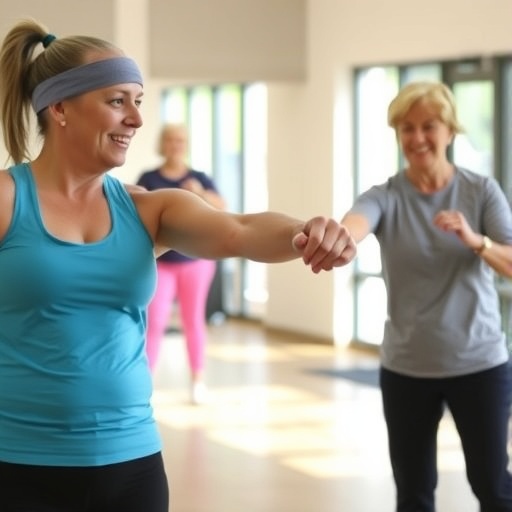In a groundbreaking development in the management of metastatic breast cancer, recent findings from the PREFERABLE-EFFECT study demonstrate that a structured, supervised exercise regimen significantly enhances muscle mass, strength, and overall physical performance in patients living with advanced disease. Presented at the Advanced Breast Cancer Eighth International Consensus Conference (ABC8) in Lisbon, these results offer a promising avenue for improving the quality of life for a patient population traditionally excluded from such research due to the complexities of their condition and treatment protocols.
The study, led by Professor Anne May, a distinguished Clinical Epidemiologist specialized in Cancer Survivorship at the University Medical Center Utrecht and the Netherlands Cancer Institute, specifically targeted patients with stage IV metastatic breast cancer. This cohort, often experiencing debilitating side effects including fatigue, nausea, pain, and muscle wasting, was enrolled in a comprehensive nine-month exercise program designed to address declines in skeletal muscle mass and functional capacity. The exercise intervention combined aerobic, resistance, and balance training, tailored and supervised by expert trainers to suit individual patient capabilities and treatment statuses.
Skeletal muscle mass, particularly in the arms and legs, is critically linked to mobility, functional independence, and resistance to falls—concerns acutely magnified in breast cancer patients with metastatic spread, especially those with bone metastases. The PREFERABLE-EFFECT study intricately measured whole-body lean mass, a primary indicator of muscle health, and found that participants undergoing supervised exercise experienced an average increase of 0.79 kilograms after three months and maintained a muscle mass retention advantage at six months compared to controls. These findings represent a pivotal shift from previous assumptions that advanced cancer and its treatments irreversibly diminish physical function and muscle integrity.
Notably, the study’s rigorous randomized controlled design spanned multiple international centers, including Germany, Poland, Spain, Sweden, The Netherlands, and Australia, enrolling 357 participants between 2019 and 2022. Such diversity enhances the generalizability of the results, reflecting a broad spectrum of metastatic breast cancer patients mostly undergoing first or second-line therapies. Importantly, most participants presented with bone metastases, a factor compounding their risk for fractures and functional decline, thereby underscoring the critical nature of the exercise intervention’s impact on balance and musculoskeletal strength.
Muscle mass gains observed were not uniform throughout the body but concentrated in limbs instrumental for daily activities and weight-bearing functions. The study reports statistically significant improvements in skeletal muscle mass index (SMI), an analogue to body mass index for musculature, with increases of 0.22 kg/m^2 at three months and sustained improvement at six months in the exercise group. Conversely, the control group experienced declines in both muscle mass and SMI, highlighting the natural trajectory of muscle degradation in untreated metastatic breast cancer patients.
Beyond mass accrual, functional assessments revealed enhanced physical performance, including improved balance and muscle strength, which directly correlate with decreased fall risk. This is especially salient given that neuropathy induced by chemotherapy can exacerbate balance deficits and frailty. One patient’s anecdote vividly illustrates these gains—initial incapacity to safely use public transportation was reversed through commitment to the exercise program, enabling renewed community engagement and autonomy.
While the exercise intervention robustly augmented lean muscle mass and strength, no significant differences were observed between groups in terms of whole-body fat percentage. This specificity suggests that exercise predominantly mitigates cancer-and-therapy-induced muscle wasting rather than inducing broad body composition shifts, a nuanced finding that informs future intervention targets.
The mechanistic underpinnings of these improvements likely extend beyond physiological alterations alone. Strengthened musculature is associated with better treatment tolerability, potentially reducing the incidence of dose-limiting toxicities and enabling adherence to full therapeutic regimens. Additionally, increased muscle strength has been linked to improved survival outcomes and enhanced quality of life metrics, encompassing physical, psychological, and social dimensions for patients often facing chronic disease trajectories.
This study represents a significant paradigm shift. Historically, patients with metastatic breast cancer were frequently excluded from exercise trials due to concerns about safety and efficacy. The PREFERABLE-EFFECT study’s success challenges this notion, advocating for the integration of supervised, comprehensive exercise programs as standard-of-care components. The resistance training element is especially emphasized, given its effectiveness in combating muscle atrophy.
Looking forward, the ABC Global Alliance plans to launch a Physical Activity Resource Hub by early 2026, providing tailored exercise resources for patients, caregivers, and healthcare professionals. This digital platform will incorporate instructional videos, customizable exercise guides, and evidence-based guidance to accommodate varying metastases locations, symptom burdens, and fitness levels. The initiative is spearheaded by experts including cancer physiotherapist Isabelle Aloi-Timeus and patient advocate Eva Schumacher-Wulf, ensuring the hub’s practicality and relevance.
The broader oncology community and cancer care providers increasingly recognize that effective cancer management encompasses not only oncologic control but also the preservation and enhancement of functional status and life quality. Professor Fatima Cardoso, President of ABC Global Alliance, underscores this ethos, emphasizing that empowering patients through supervised exercise constitutes a vital therapeutic adjunct, enabling patients to regain agency over their health and daily lives.
In sum, the PREFERABLE-EFFECT study solidifies the role of exercise as a potent, evidence-based intervention mitigating muscle wasting, enhancing physical performance, and ultimately improving the lived experience of patients with metastatic breast cancer. This milestone advances a holistic model of cancer care, positioning physical activity as indispensable in the continuum of treatment and survivorship.
Subject of Research: People
Article Title: Exercise and body composition
News Publication Date: 7-Nov-2025
References:
[1] Anne May, “Exercise and body composition”, Presentation at the Advanced Breast Cancer Eighth International Consensus Conference (ABC8), 7 November 2025.
[2] PREFERABLE-EFFECT study: Project on Exercise for Fatigue Eradication in Advanced Breast to improve quality of Life – Effects of exercise in patients with metastatic breast cancer.
Image Credits: Anne May
Keywords: Breast cancer, Breast carcinoma, Cancer, Cancer relapse, Health care, Physical exercise, Health counseling




